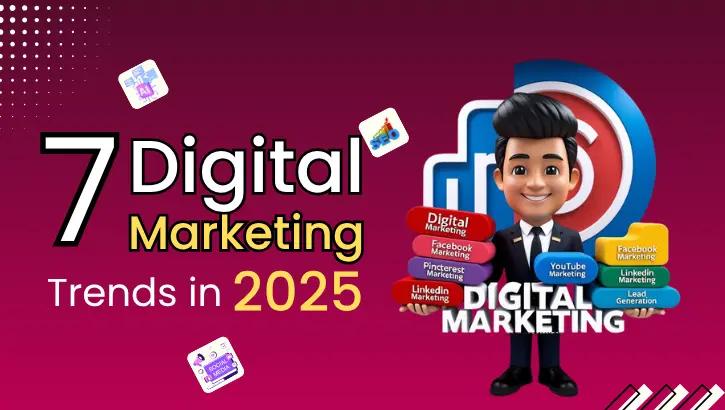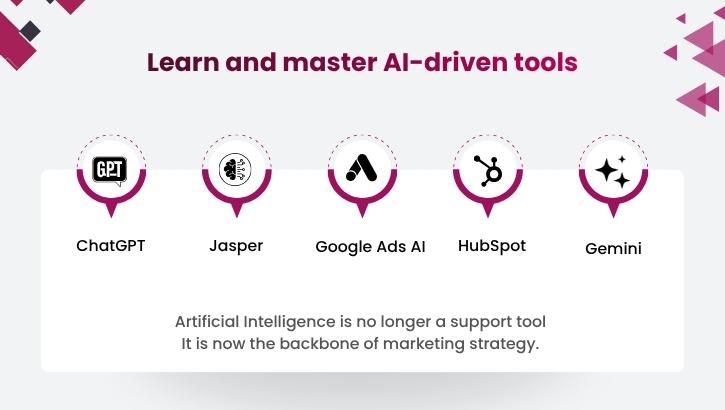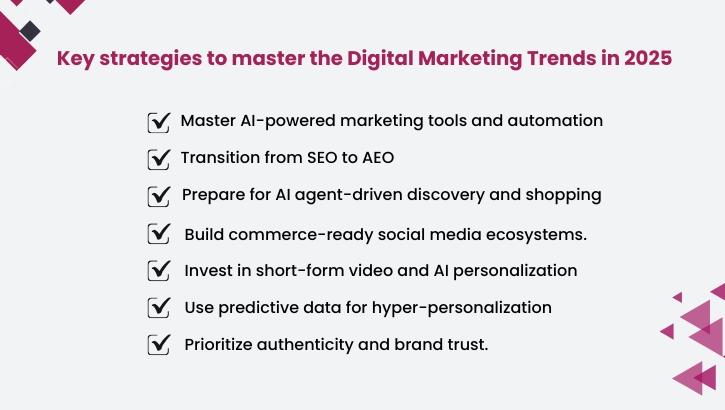


Digital Marketing Trends in 2025 are evolving faster than ever. What worked in 2020 no longer guarantees attention, traffic, or conversions today. Artificial Intelligence, shifting consumer trust, new platforms, and changing search behavior are completely redefining how people discover, engage with, and buy from brands.
If you’re still relying on the same strategies from five years ago, you’re already behind. The marketing winners of 2025 will be those who adapt early understanding what’s changing, how technology is transforming user behavior, and how to align strategy, content, and creativity with these shifts.
Based on the latest insights from industry experts, platforms, and emerging data, here are the 7 Digital Marketing Trends in 2025 That Will Dominate and how businesses, marketers, and students can leverage them for growth.

Artificial Intelligence is no longer a support tool; it is now the backbone of marketing strategy. From campaign planning and audience targeting to content creation and data analysis, AI is enhancing every aspect of Digital Marketing Trends in 2025 .
As part of the Digital Marketing Trends in 2025, Generative AI tools such as ChatGPT, Jasper, and Midjourney are revolutionizing how marketers create blogs, ad creatives, and video content. Meanwhile, Predictive AI tools like Google Performance Max, HubSpot AI, and Prescient AI are empowering brands with smarter ad placements, dynamic bidding, and more accurate ROI forecasting helping marketers make faster, data-driven decisions.
A Chennai-based retail brand using predictive AI in ad campaigns can automatically adjust budget allocation between Google and Meta Ads based on conversion probability, reducing cost per lead by up to 30 percent.
Learn and master AI-driven tools. For students, this means training in ChatGPT, Jasper, Google Ads AI, and HubSpot. For businesses, integrate AI workflows into campaign management.
SEO as we knew it, optimizing for keywords and backlinks is rapidly transforming. With the rise of AI-powered search engines, including Google’s SGE (Search Generative Experience), ChatGPT Browse, and Perplexity AI, the game is shifting from ranking pages to delivering direct answers.
Users no longer want to scroll through ten blue links. They ask a question and expect an instant, accurate response. This evolution has given birth to AEO (Answer Engine Optimization) optimizing your content to become the answer AI assistants deliver.
Example:
Instead of optimizing for “best digital marketing course in Chennai,” a WHY TAP blog could target conversational questions like “Which digital marketing institute in Chennai provides placement support?” and appear as a direct AI answer.
Focus on structured content: FAQs, schema data, voice search optimization, and intent-driven copy.
2025 will see the growth of AI agents that act autonomously researching products, comparing prices, and even purchasing on behalf of users. This concept, known as Agentic Marketing, is redefining how consumers make decisions.
Instead of typing searches, users may ask their digital assistant to “find the best laptop under ₹70,000 with extended warranty.” The AI agent will scan multiple sources, evaluate reviews, compare prices, and complete the purchase.
For marketers, this means your brand needs to be answer-ready and data-structured so that AI agents can find and recommend your offerings.
An e-commerce brand in India that provides structured product data through APIs and voice integration will appear in AI agent recommendations during “smart shopping” experiences.
Prepare for the agent economy. Implement APIs, maintain accurate pricing and product data, and adopt Answer Engine Optimization to ensure your brand appears in agent-driven decisions.
In 2025, social platforms are no longer just discovery tools they’re full-fledged sales channels. Instagram Shops, TikTok Shop, and YouTube Shopping are merging entertainment with transactions, creating a new behavior called content-to-commerce.
Audiences now prefer to buy directly from within their feed rather than visit an external website. This is particularly relevant in India, where social commerce is projected to reach USD 70 billion by 2030, driven by Gen Z and regional influencers. This is one of the digital marketing trends in 2025.
Example:
A Chennai-based beauty brand using Instagram Reels with integrated shopping tags can generate sales directly from product demos and influencer shoutouts, bypassing e-commerce listings entirely.
For businesses: Enable in-platform shopping.
For students: Learn paid social strategies, influencer collaborations, and shoppable content creation.
Short-form video continues to rule social media but Digital Marketing Trends in 2025, it’s powered by AI personalization. Platforms like YouTube Shorts, Instagram Reels, and TikTok use AI to predict exactly what users want to see next, increasing both engagement and retention.
AI tools like Syllaby and Runway ML allow marketers to auto-generate short videos, captions, and voiceovers. This enables brands to produce 10 times more video content with minimal resources.
Example:
At WHY TAP, students create portfolio reels using Syllaby to showcase their campaigns. With AI editing, they can produce professional-quality videos within hours, gaining visibility and credibility online.
Invest in AI video tools and experiment with personalized content formats. Build campaigns that connect through storytelling rather than promotion.
When we speak of digital marketing trends in 2025, personalization has moved beyond “Hi [Name].” AI can now analyze thousands of data points location, preferences, timing, browsing behavior to create a predictive experience for each user.
Predictive marketing tools identify what customers are likely to buy next and deliver tailored offers automatically. Netflix, Amazon, and Spotify already use this method; now, small businesses can do the same using affordable AI tools.
Example:
An Edtech company in India can use predictive analytics to suggest courses to students based on their browsing behavior and completion history, increasing enrollments without additional ad spend.
Action Step:
In Digital Marketing Trends in 2025 That May Leverage tools like HubSpot AI, Persado, and Salesforce Einstein for predictive engagement. Ensure your CRM and website collect enough behavioral data to feed these systems.
As AI-generated content floods the internet, authenticity is becoming the new currency of trust. In 2025, consumers are skeptical of automation and prefer brands that sound real, relatable, and transparent.
This shift means human storytelling, ethical communication, and community engagement are more important than ever. People don’t just buy products; they buy values, experiences, and emotional connections.
Example:
A brand that uses real student success stories, behind-the-scenes content, and unfiltered testimonials on Instagram builds deeper trust than one using polished, generic visuals.
Blend AI efficiency with human emotion. Use automation for insights but retain authenticity in voice and storytelling. Build communities, not just campaigns.
Digital marketing trends in 2025 is not about tools alone; it’s about transformation. AI is rewriting every aspect of marketing; how content is created, how data is analyzed, and how trust is built. The marketers who succeed will be those who combine technological fluency with human creativity.
